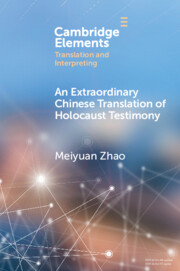Element contents
An Extraordinary Chinese Translation of Holocaust Testimony
Published online by Cambridge University Press: 25 November 2024
Summary
- Type
- Element
- Information
- Online ISBN: 9781009549844Publisher: Cambridge University PressPrint publication: 09 January 2025
References
- 2
- Cited by

